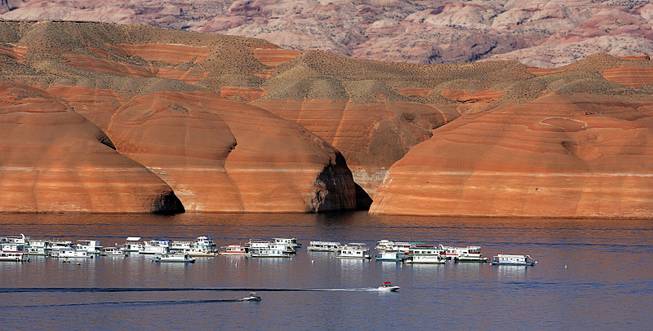
Douglas C. Pizac / AP
Houseboats are moored on Lake Powell in Bullfrog, Utah, in this July 12, 2006 file photo. The lake’s former, higher levels are marked by the bathtub-like rings on the embankment, rear.
Monday, April 17, 2017 | 6 p.m.
The federal government said Monday it plans to release an above-average amount of water from a major reservoir in the Southwestern U.S. this year, but it's less than many hoped after a healthy snow season across much of the West.
The Bureau of Reclamation, which manages dams and reservoirs on the Colorado River, said it will release 9 million acre-feet from Lake Powell, sending it down the Colorado into Lake Mead, where it will be tapped by Arizona, California and Nevada.
An acre-foot can supply two typical homes for a year.
Last month, the agency projected it could release 11.1 million acre-feet from Lake Powell, but a dry early March reduced the amount of snow in the mountains that feed the river.
Still, the planned release is above the annual average of 8.7 million acre-feet (10.7 billion cubic meters), and it should be enough to delay a widely expected shortage in Lake Mead, said Marlon Duke, a spokesman for the Bureau of Reclamation.
A shortage would trigger cuts in water deliveries to Arizona and Nevada, the first states to be hit under the multistate agreements and rules governing the Colorado River. That had been expected as soon as next year.
"It's pushed that shortage likelihood out into the future," Duke said, but it's too early to say how far.
Melting snow is expected to raise the level of Lake Powell by about 50 feet by mid-July, but after the 9 million acre-feet is released, the reservoir will be about 35 feet (10.67 meters) higher on Oct. 1 than it is now, he said.
The two reservoirs are part of the Colorado River system, which supplies water to about 40 million people and 6,300 square miles of farmland in seven states and 20 Indian reservations. Mexico is also entitled to a share under a treaty.
A prolonged drought and rising demand for water have overtaxed the river. Some researchers say global warming is also affecting water flows.

Join the Discussion:
Check this out for a full explanation of our conversion to the LiveFyre commenting system and instructions on how to sign up for an account.
Full comments policy